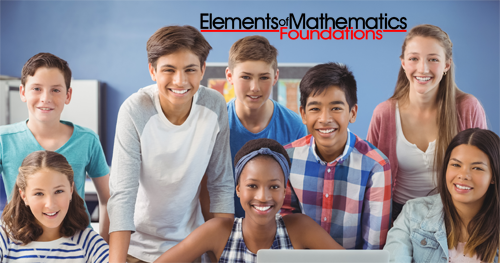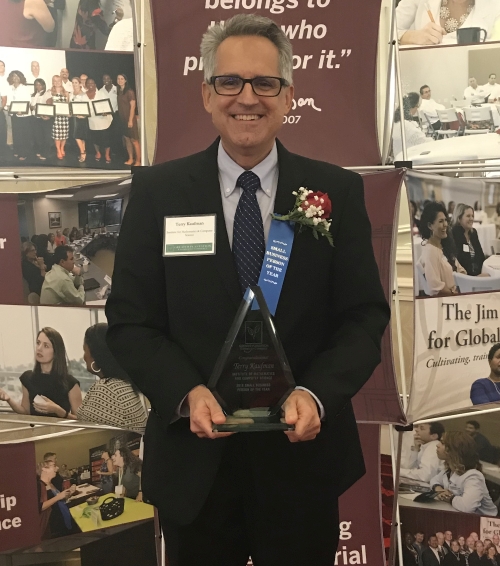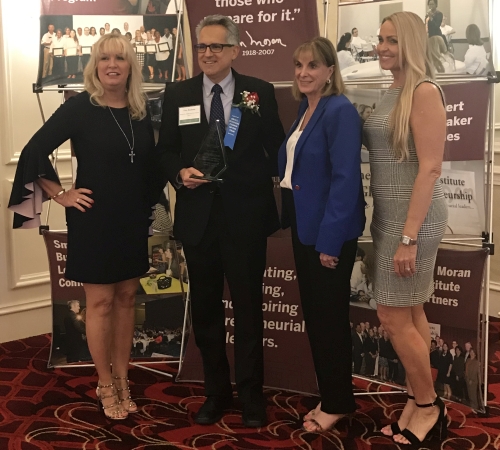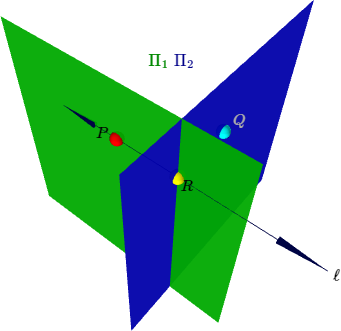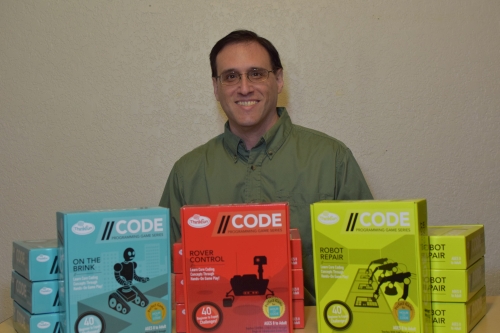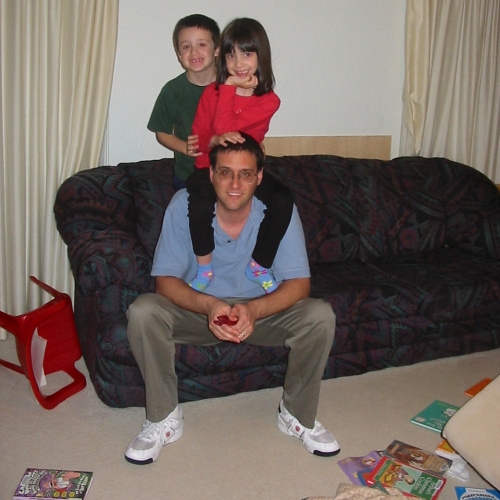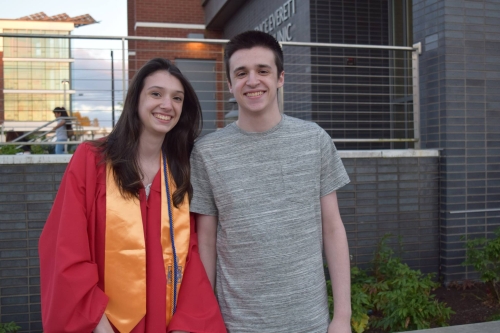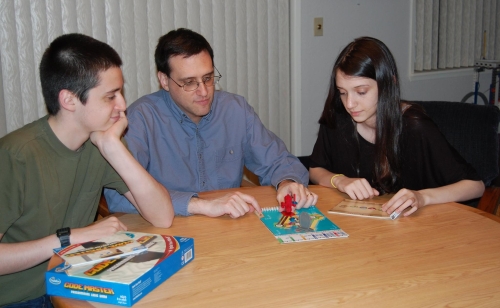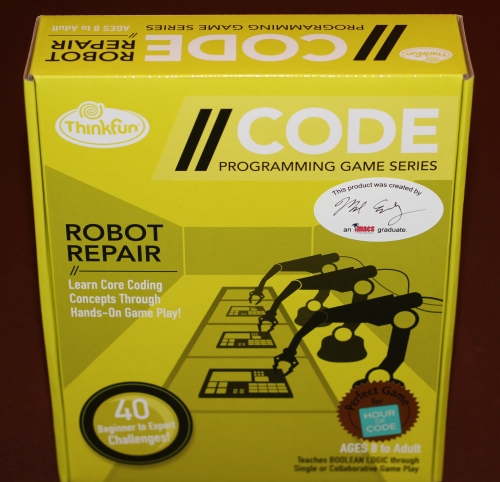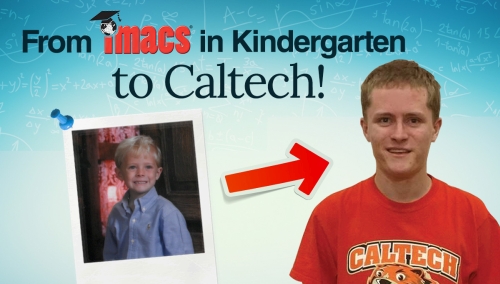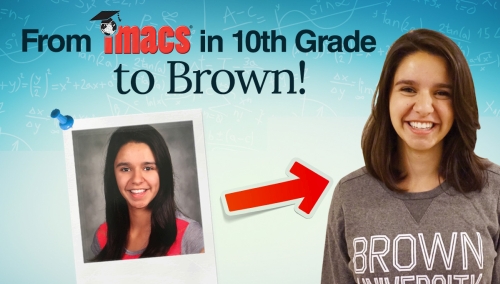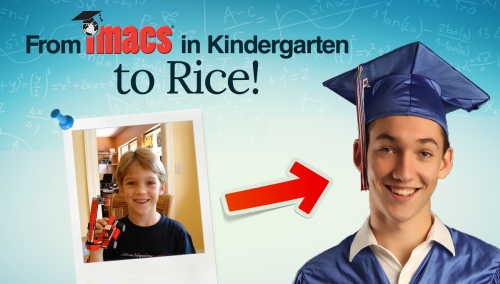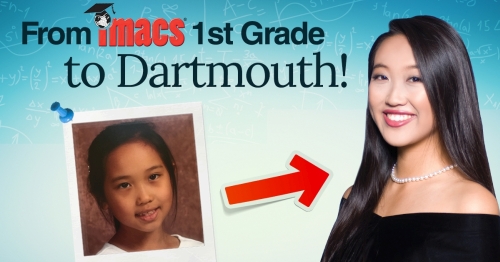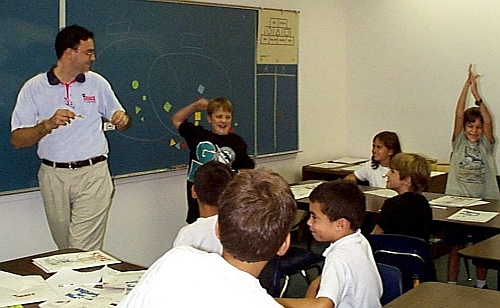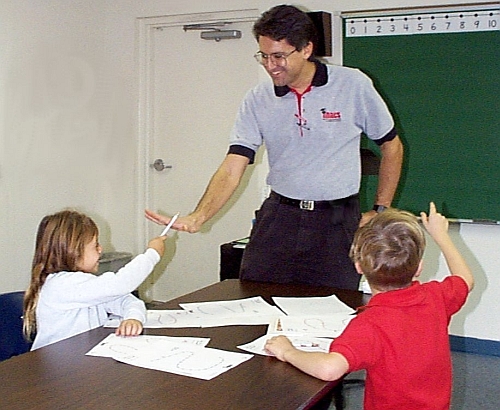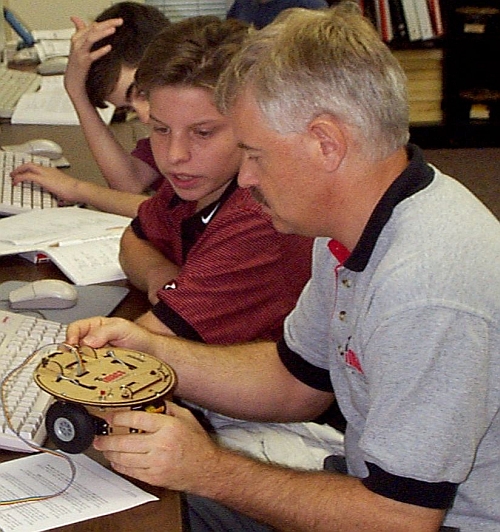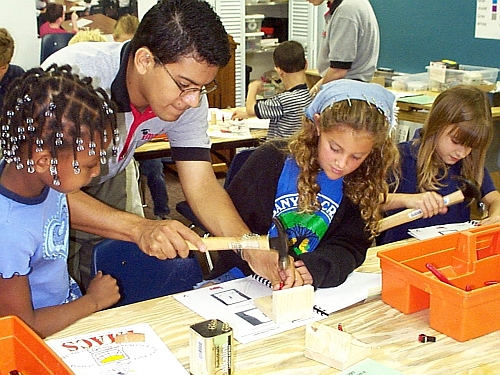
The Institute for Mathematics and Computer Science (IMACS) is thrilled to announce that the Elements of Mathematics: Foundations (EMF) online program for talented middle school students is now complete with the release of the 18th and final EMF course, Precalculus Coda.
Precalculus Coda brings together topics from earlier EMF courses and expands on them with an extensive study of vectors in the real number plane and space, linear transformations (including orthogonal mappings), and matrices and their application in solving systems of equations.
Upon successful completion of the EMF program, students will have covered all national and state math standards for pre-algebra through precalculus but from an entirely modern mathematical approach. In addition, they will have enjoyed thorough introductions to college-level topics such as Abstract Algebra, Logic, Set Theory, Number Theory and Topology, and be well-prepared to excel in a college-level Calculus course.
Why Modern Mathematics
Mathematically talented students typically master school math with little effort. As a result, they tend to become bored with and disengaged from math if limited to traditional curriclum. They may also fail to develop the mental resiliency and study skills that come with having to work hard at math problems designed for their ability level.
The EMF curriculum is designed specifically to engage young, gifted thinkers in ways typically reserved for university math majors. It is useful to distinguish the two ways in which EMF is college-level: (1) the sophisticated use of logic and reasoning via proofs, and (2) the introduction of modern areas of mathematics such as Topology.
EMF incorporates all the concepts from a traditional curriculum but uses a logic and proof-based approach not usually entrusted to students until college. Talented middle school students who are intellectually mature and motivated can benefit from this more sophisticated approach; it fosters the development of creative thinking skills that are not easily replaced by computer processing power as algebraic manipulation skills already have. In other words, EMF prepares students with skills for the future, not skills of the past.
EMF's incorporation of exciting topics in modern mathematics—topics ignored by traditional school math—makes it far more interesting and intellectually engaging. These topics represent areas of active research as opposed to traditional school math subjects that were understood completely by the late 17th century. The idea of cutting off a child’s education in literature, history or science at the 17th century is ludicrous. The same applies to mathematics.
Access Matters
For children in many parts of the US and around the world, EMF now fulfills the promise of opening up access to a comprehensive, unified, proof-based approach to modern mathematics. IMACS certainly believes in the value of talented and dedicated teachers, but we also believe that lack of access to such teachers has unfairly limited for too many bright students the right to be challenged at their ability level on the way to achieving their full potential in mathematics. We aim to change that with EMF.
Course 1 < $20
In celebration of EMF's completion, tuition for the first course has been dropped to $19.95 (regularly $59.95) for a limited time. Through August 31, 2018, new families save 67% on the first EMF course or 25% on a bundle of all 18 courses. Visit EMFmath.com to learn more and enroll.
EMF in Schools
Did you know that numerous districts, schools and after-school programs license EMF? In fact, the first cohort of EMF students in Broward County Public Schools, Florida completed the program last year. As a result, many of them will be enrolling in Calculus as 9th graders this fall. If you would like to see EMF offered in your school, share the EMFmath.com/schools website with the relevant decision-makers in your district.
Terry Kaufman, President of the Institute for Mathematics and Computer Science (IMACS), co-founded IMACS in 1993 to provide talented students with an outlet for reaching their highest potential in math, computer science and logical reasoning. Over the past 25 years, IMACS has grown steadily from just 37 students in Plantation to over 1,000 students across South Florida and more than 3,500 students online.
Terry is most proud of the fact that IMACS regularly produces graduates who go on to leading universities such as Stanford, Harvard and MIT. Having graduated with a masters degrees in Mathematics from Johns Hopkins University followed by a successful high-tech career, including 10 years in software development and management at IBM, Terry is well aware of the creative thinking and problem-solving skills that top universities and cutting-edge companies look for and strives to develop these skills in every IMACS student.
The following is an excerpt from Geometry: Incidence and Transformations, the first of three Geometry courses in the self-paced Elements of Mathematics: Foundations (EMF) series. EMF covers Pre-Algebra through Precalculus, plus several university-level topics, with the depth and sophisitication needed to challenge and mathematically talented children. Limited Time Offer: The first EMF course is available at 25% off regular tuition for students who enroll on or before October 31, 2017. Learn more at www.EMFmath.com.
In this course and the next our main focus is on Euclidean geometry. As you have undoubtedly noticed, in the preceding courses we have quite frequently talked about, considered, and even worked with a wide variety of geometrical concepts. But we have been relying on common knowledge and your intuitive understanding of such things; we have only rarely hinted at the formal underpinnings of this very important and pervasive area of mathematics.
The history of the study of geometry is very long and honorable, springing out of humanity’s attempts to describe mathematically the forms, shapes, and patterns seen in the real world.
Roughly speaking, our intended plan of study in this course is as follows: Each of us has a store of experiences with real objects, their forms, and their shapes. These experiences will be refined as we draw pictures of objects, observe specially constructed models of objects, and think about experiments that could be performed with these objects. As we sharpen our experiences with physical objects, we will describe corresponding geometric objects (such as points, lines, and planes), and decide what properties these geometric objects should have if they are to be mathematical replicas of the real objects. Of course, geometric objects, like all other mathematical objects, are abstractions, so the only role that can be played by our drawings and experiments with physical points, lines, and planes is that of serving as a guide to the properties that should be ascribed to their abstract geometric counterparts.
The properties we ascribe to the geometric objects will be called agreements. That is, we will agree to accept a certain property about geometric points and lines, say, because our experience strongly suggests that physical points and lines have that property. Of course, agreements in geometry, as in real life, have consequences. This then is the activity of geometry: to find out what the consequences of the basic agreements are.
In other words, we shall agree that the geometric objects we wish to study have certain basic properties. We shall then deduce that geometric objects with these properties must also have certain other properties. We will discover these new properties, not by looking at the objects (remember, geometric objects are abstractions!) but by thinking about them. We will express our thoughts in arguments of the following general form: Since we have accepted our basic agreements, then we must also accept that such and such is the case. But then we are constrained to accept that thus and so, etc. Finally we examine these new properties in order to decide whether they too are compatible with our experience of physical objects. In this way, Euclidean geometry becomes the mathematics of the shapes and forms of the world around us.
The IMACS Blog reconnects with alumnus Mark Engelberg who recently released three new coding games through ThinkFun and Target. (Win an autographed copy of one of Mark's new games!) Mark's passion for computer science, math and logic led him to an award-winning career in puzzle and game design. He is also an active speaker in the Clojure programming language community. In this post, Mark talks with IMACS about what it was like to be a homeschool dad to two amazingly talented children who are now accomplished young adults in their own right.
First, tell us about your new ThinkFun games.
Two years ago, I invented a programming puzzle game for ThinkFun called Code Master. Code Master was a commercial and award-winning success, so ThinkFun asked me to develop a new line of puzzle games, where each game would highlight a specific underlying principle of computer science. The new line of games is called the //CODE Programming Game Series. To design the games, I started from a list of concepts I wanted players to encounter, and kept trying out ideas and tinkering with the rules until I felt I had a combination of mechanisms that covered those concepts and was fun to play.
The first game in the series, On the Brink, is an introduction to procedural abstraction — the idea that we're not just writing programs to solve a one-off task, we're building components that solve multiple instances of an underlying problem, and then using those components to build higher-level components, and so on. The second game, Rover Control, focuses on the essential skill of stepping through programs in your head and visualizing the outcome, particularly with flow control constructs like if-then-else statements, while loops and for loops. The third game, Robot Repair, is all about Boolean logic. When developing Robot Repair, I leaned heavily on the material that I learned as a child in IMACS' Advanced Mathematical Logic courses. I think students in your Logic courses are really going to enjoy Robot Repair. Like their predecessor, Code Master, all three of the new games are "unplugged" computer science board games that come with a book of puzzles for solo or cooperative gameplay.
You are also a parent of two gifted children who are now ages 19 and 17. About how old were Alex and Molly when you first suspected that they were gifted? What were the signs?
I was a stay-at-home dad, and when Alex and Molly were toddlers, I taught them to read and write and gave them daily math lessons. Honestly, I mostly did those things to keep myself from getting bored; it was fun for me to feed their intellectual curiosity. My wife did the same with the kids when she was home from work. That was just our parenting style. We wanted the kids to have the opportunity to learn these core skills as soon as they were capable, and the easiest way to achieve that was to throw a lot of educational activities at them early, just to see what would stick. As it turned out, more of it stuck than we expected!
I didn't really have much to compare their development to until the day I went to Alex's kindergarten orientation. As the teacher explained what the students would be doing in the coming year, it dawned on me that my kids had already done those things. I realized that I had inadvertently given my kids a big jumpstart, and what I had been doing was working, so I might as well keep doing it. And that's how I ended up deciding to homeschool my kids.
Because I homeschooled my kids, the label "gifted" didn't really come into play. I never needed to get them tested, or prove anything to a school official. But it was clear to me that they had the capacity to learn faster than what our school system provides, so I set out to do my best to keep them challenged and allow them to fully develop their individual talents.
How did you feel when you knew for certain that they were gifted?
It felt like a tremendous responsibility to help them achieve their full potential, even more so because I was choosing to take on that responsibility myself rather than relying on the school system. If things didn't work out, I would have no one to blame but myself. It was a lot of pressure. I didn't really doubt my capability to teach them, but I knew it would be an enormous undertaking, one that would require the bulk of my time and attention for nearly 20 years. It was well worth it — I'm so proud of the young adults they've become — but I'm relieved to have reached the point where that responsibility is behind me rather than in front of me.
As you looked into ways to meet their educational needs, what did you discover?
One pleasant surprise was realizing that it isn't necessary to be an expert in everything in order to meet your kids' educational needs. In many cases, it's more about playing the role of an advocate, connecting them up with the right resources. I would track down private teachers, public school classes, homeschool co-op classes, other parents, books, videos, and websites for the areas I was less equipped to handle. I did my part for the homeschooling community by serving as a teacher of math and computer science for many other talented kids whose parents were not as adept at those particular subjects.
What were some of the programs, opportunities or approaches that you found helpful in making the most of their talents and interests?
One of the things that was really important to me was to make sure my kids had a strong foundation in math and computer science. Fortunately, I have the advantage that I learned the IMACS curriculum when I was in middle school and high school. This made it easy for me to teach these subjects because I'd already experienced first-hand what a top-tier math and CS education looks like. To duplicate that experience for my kids, I simply taught them using the same materials and techniques that I had learned at IMACS and in college. Those resources played a big role in giving me the confidence to homeschool.
What were some of the benefits and challenges of homeschooling? How did you deal with the challenges?
One of the biggest challenges of homeschooling is that it takes effort to find a community to be a part of. We are fortunate that here, where we live in Seattle, there is a robust homeschooling community and we were able to find a group that fit our personalities and make many dear, lifelong friends. Once we found the right community for us, those rich social interactions became one of the biggest benefits of homeschooling. Our weekly park days remain some of my most cherished memories.
Another big challenge is that, even though my kids are close together in age, they were far enough apart that I couldn't do the same lessons with them. I always felt like I was struggling to give each of them the level of individual attention I wanted to give them. My solution was to make certain parts of the day relatively structured and leave the other parts of the day flexible so that I only needed to schedule the structured parts. For example, I might be doing structured math lessons with one child while the other was doing creative writing or watching an educational video, and then switch.
What were some other challenges you faced in parenting gifted children, and how did you deal with those?
Gifted children can be wildly asymmetric in their abilities, and wildly different from one another in terms of their talents and interests. It was a constant challenge to avoid getting impatient when one of my children would struggle with a concept that came naturally to the other. I had to keep reminding myself that it was totally normal for them to have different strengths and weaknesses.
How did being a gifted adult who was once a gifted child affect your educational and non-educational parenting choices?
This was especially helpful when my kids' interests dovetailed with my own. My son, for instance, developed a keen interest in programming, and thanks to my own background, I knew exactly what to do to support him in that interest. When my kids' interests and abilities diverged from mine, it was a lot tougher, and I ended up doing what any parent would do … seeking out people and resources that could help my kids develop their talents.
What are your fondest memories of raising Alex and Molly?
Probably my fondest memories are the many times we played board games together over the years. For those moments, instead of having a parent/child relationship, or a teacher/student relationship, we were just people playing games together and enjoying each other's company. I feel like at those moments, I really gained some insight into their character, and got a glimpse of what they would be like as adults.
What are your hopes for them in the future?
My hope has always been for them to be good, caring, compassionate, independent, happy adults. The good news is … they already are. I'm done! Woohoo!
Robot Repair was inspired by Mark's study of the IMACS’ Advanced Mathematical Logic curriculum.
Residents of the continental United States are eligible for the Robot Repair Raffle. The autographed copy of Robot Repair will be shipped only to an address in the continental US. To enter the raffle, complete the following steps:
- Parents must register their child to take either the EMF Aptitude Test (ages 10-14, approximately) or the eIMACS Aptitude Test (ages 14-18, approximately).
- On the aptitude test online registration form, type "IMACS Blog" in the box for "How did you hear about us?" or "How did you hear about IMACS?".
- Have your child take the aptitude test for which he or she is registered. The test must be taken during the period October 1-30, 2017. (No minimum test score is required to qualify for the raffle.)
RJ was an IMACS student from kindergarten through 12th grade and took every class IMACS offered, including all levels of Math Enrichment, Computer Enrichment, Hi-Tech Summer Camp, University-Level Computer Science, AP Computer Science: Java Programming, and University-Level Logic for Mathematics.
With a 5.9 GPA and 2360 on the SAT, RJ graduated as co-valedictorian and was honored as a US Presidential Scholar candidate, National AP Scholar and National Merit Scholar. He and his teammates were also four-time Science Olympiad state champions.
RJ was accepted to Caltech, Georgia Tech, Carnegie Mellon, and the University of Florida. He chose Caltech where he took junior-level Computer Science classes as a freshman and served as a Teaching Assistant for those classes as a sophomore. RJ conducted summer research in computer vision and was selected for an internship at Northrup Grumman. He will graduate with a double major in Computer Science and Philosophy and plans to attend graduate school to specialize in Machine Learning.
“IMACS taught me an organic approach to problem-solving, a way of thinking that demonstrates the necessary rigor required to solve genuinely challenging problems. The introduction to proofs and logic that I got at IMACS was absolutely critical to my success at Caltech.”
Congratulations, RJ!
RJ Antonello
Cori wanted to understand the fundamental concepts that make up the sophisticated theories of Computer Science. She started IMACS during the summer before tenth grade and went on to complete IMACS’ University Computer Science track and AP Computer Science: Java Programming course. Cori scored a 5 on the AP Computer Science A exam, 800 on the math portion of the SAT, and was named a National Merit Scholarship Finalist.
Cori’s keen interest in using her knowledge to understand real-world problems inspired her to write a Naive Bayes machine learning algorithm to detect political bias in online news articles. Her paper on it was selected for presentation at the Georgetown Junior Science and Humanities Symposium, and she was honored as an affiliate winner for the National Center for Women and Information Technology’s Aspirations Award.
Cori chose Brown University where she was accepted early decision and plans to study Computer Science and Economics. She hopes to pursue a career applying data science within education or a service-based field.
“IMACS turned the slightly enigmatic, ever-changing field of Computer Science into a never-ending set of fun puzzles for me to solve. It brought to my attention the intricacy and beauty of the field while illustrating how I could become a part of it.”
Congratulations, Cori!
As a young child, Mason excelled in IMACS Math Enrichment classes and, in subsequent years, attended several weeks of IMACS summer camps. He later completed IMACS’ university-level courses in Computer Science and Logic for Mathematics. Mason was honored by the College Board’s National Hispanic Recognition Program for his achievement on the PSAT/NMSQT, and his high school mathematical modeling team was recognized by the Consortium for Mathematics and its Applications. Mason graduated high school with a perfect 4.0 GPA and 34 on the ACT.
A natural at sharing knowledge, Mason enjoys tutoring students in science and math at a local homeschool co-op, co-taught a robotics class for two years, and was a Teaching Assistant for an Honors Calculus seminar. He accomplished this and more while being an all-county varsity and travel soccer player and a dual-enrolled student at a regional 4-year university.
Mason chose Rice University where, at 16 years old, he was accepted early decision into the George R. Brown School of Engineering. He plans to major in Materials Science and NanoEngineering.
“My early exposure to IMACS provided me with a unique foundation in logic and mathematics that helped me succeed in advanced STEM classes at a very early age. I understand numbers intuitively and am able to solve complex problems in my head thanks to my IMACS training.”
Congratulations, Mason!
Snow began IMACS in 1st grade and completed all levels of IMACS Math Enrichment. She returned during high school to complete the IMACS University Computer Science track. Snow’s talents and keen interest in programming, civics, and service propelled her to 1st place finishes at FIU’s Google Startup Competition, Ft. Lauderdale’s Code for America Civic Hackathon, JusticeHack Miami, and Yale’s Bulldog Invitational Mock Trial Competition.
In addition to being selected as a National Merit Finalist, Snow was named Cadet of the Year by the Florida Wing of the Civil Air Patrol and won 1st Place at the National Cadet Special Acts Competition. Snow credits IMACS for the way she thinks and approaches every aspect of her life.
With a 5.5 GPA, 1580 out of 1600 on the SAT, and 800 on the SAT Math II exam, Snow was accepted at Dartmouth, UC Berkeley, NYU, Vanderbilt, Wellesley, and the University of Miami. She chose Dartmouth where she plans to double major in Computer Science and Economics and eventually pursue a career in cyberlaw or cybersecurity.
“IMACS is the one place that doesn’t teach you steps to get to a specific solution but rather how to use logical and creative thinking to develop your own solution. It is the embodiment of everything learning should be.”
Congratulations, Snow!
This month's IMACS blog post is by guest author and eIMACS student, Naomi Spargo. Naomi recently sent us the following letter and kindly agreed to let us share it with our blog readers. Learn more about the eIMACS online courses that helped Naomi develop a passion for math and computer science and be prepared for a summer program in Artificial Intelligence at Stanford.
Dear IMACS,
I recently got back from the Stanford Pre-Collegiate Summer Institutes program and wanted to let you know that it was absolutely amazing! It was very intense, but I also learned a ton. I learned about all the different techniques that fall under the umbrella of artificial intelligence such as machine learning, neural networks, and search algorithms. (I found the search algorithms that I learned in eIMACS very helpful.) I also learned answer set programming, which had a very steep learning curve for most of the class because they had never encountered formal logic before. I was at a big advantage because of the logic classes I took with eIMACS.
Other than a more sophisticated approach to coding, what I took away from Stanford was a better understanding of how sprawling of a field computer science is. I've always approached coding in a very mathematical manner because mathematics has always been my strongest area of expertise. At this camp, I encountered many other coders that aren't particularly strong in math but have a heavy background in something else, like robotics.
The way we approach problems is extremely different. Depending on the problem, my approach works much better than theirs or vice versa. There are so many different fields within computer science; each field lends itself to a different type of mind. I now see the need to specialize within computer science, perhaps on data analysis or cybersecurity (both math-heavy fields).
I also wanted to take this opportunity to thank you for making advanced coursework available and enjoyable for young people like me. Your courses have been a godsend in three primary areas:
1. They helped me develop a passion for math/computers.
I had a strong dislike for math classes before I took your courses because the way math is taught in schools is very dull. My biggest frustration with school math classes was how shallow the content was; we were essentially being taught to memorize symbols. Only occasionally were we offered a real understanding as to how the symbols connected. I hungered for deeper meaning in mathematics, and was doing my best to figure it out myself.
The only math I enjoyed was the work I did myself with a store-bought textbook and a calculator. I didn't associate the math I did with any structured "class" because every class I had taken was slow, boring, and surface level. I was excited to learn, but my approach to learning was unorganized and inefficient. There is only so much an eleven year old can do on their own.
eIMACS was a huge assist in this. Your courses explain everything in approachable language so I was not intimidated away as a young child, but gave me the deep understanding that I wanted. The content is presented in an interesting manner. The material was clearly written by someone who loves what they are doing, and the instructors who helped me with my questions share this attitude. This passion translated to me; I no longer felt alone when it came to my love of math. eIMACS courses pull off a rare trick in education; they explain complicated ideas to 11 year olds without sacrificing complexity. Your courses are comprehensive; you leave no questions unanswered. I enjoyed them more than anything I have taken in high school.
2. They gave me a competitive edge in nearly every subject.
It is self evident that the three computer science courses I took with you helped me with coding. The diversity of languages you offer is a huge benefit, because certain languages lend themselves to certain problems. At Stanford, the AI class teamed up with the cryptology class to crack some numerical-based codes. Haskell, which I knew thanks to you, particularly lends itself to interpreting numerical data, so I could crack the codes much faster than students who were confined to object-oriented languages like Java. You also gave me experience with complex data structures, which most coders my age have not encountered.
Similarly, the logic I have taken with eIMACS helped me with math. I often reference my tautology template when proving theorems. It gives me an organized way to express my theories and postulates. I see logic as a honing device for mathematical thought. However, the reach of these courses goes far beyond math and science. My English essays (especially the persuasive ones) often employ tautologies written out in prose form. Logic has made my writing more coherent and streamlined; it has improved my word economy because I can organize my thoughts more efficiently.
My strong foundation in logic has also made me a more persuasive speaker. I do a form of debate called extemporaneous speaking, where I have thirty minutes to prepare a seven minute persuasive speech about a current political topic. Because my time allotment is so small, I need to break down complicated economic and political concepts quickly so that the average person can understand them. Using rules of logic is an excellent way to do this. My debate coach has told me I have "logos for days"; I directly attribute this to my eIMACS courses.
3. They allowed me to specialize on what I truly loved earlier than most students.
eIMACS courses are so much more advanced than what most high schoolers are exposed to. I know much more about the fields I'm passionate about and can specialize sooner as a result. Most kids my age have no idea what they want to major in. Because of IMACS, this is not the case for me.
I feel very fortunate to have taken eIMACS courses and am thankful to all my IMACS instructors for inspiring and encouraging me. I know that my eIMACS background has prepared me well for college and whatever I decide to do after, and I feel confident that the way of thinking logically that I learned in eIMACS will help me face any challenge.
Sincerely,
Naomi Spargo
competition while playing the String Game.
The Institute for Mathematics and Computer Science (IMACS) celebrates 25 years of serving talented children by awarding $25,000 in a mix of scholarships to enroll in its online courses or to attend its South Florida after-school program. From humble beginnings of just 37 students in Plantation, Florida, IMACS has grown to include four South Florida learning centers and serves more than 4,500 students throughout the United States and in more than 15 countries.
IMACS President, Terry Kaufman, attributes the institute's longevity and growth to parents' concerns about education. "Many of our local families, as well as our online students, are actively looking for ways to develop the critical thinking skills needed in a rapidly modernizing world, and they are not finding that through traditional means," Kaufman said. "At IMACS, our goal is for students to become better thinkers and problem solvers for the rest of their lives, not just for the next standardized test."
bright, young students as he ever was.
Broward County Public Schools (BCPS), the sixth largest district in the US, recognizes the advantages of IMACS' approach. In 2015, BCPS selected the institute’s Elements of Mathematics: Foundations (EMF) online program as full-time curriculum for its top middle school math students. EMF covers pre-algebra through precalculus plus several university-level topics with depth and rigor that far exceeds traditional gifted math programs. Barrington 220 School District in Illinois recently became the second public school district to license EMF for its gifted students.
"EMF teaches very advanced mathematical concepts, yet the presentation and problem sets are designed in a way that allows middle school kids to learn the material online," noted Maxim Chekmasov, who holds a Ph.D. in mathematics and whose son Andrei is in the program.
IMACS' effort to develop the EMF online math program.
IMACS' focus on logical thinking and creative problem-solving has produced results for its graduates. Many go on to excel at top universities of their choice, including Stanford, Harvard, Princeton, MIT and Caltech, and pursue careers in fields as varied as technology, medicine, engineering, law and academia.
in Electrical Engineering and Computer Science at MIT.
IMACS classes and online courses challenge students by ability level, not by age. Online courses are self-paced and accessible 24/7 so that students can work at their individual pace and at times that fit their schedule. Local students are placed into appropriately challenging classes and moved up as they demonstrate mastery.
has been one true constant.
Scholarship Raffles
IMACS will raffle off 20 scholarships to enroll in the EMF Pre-Algebra Plus online course and five scholarships to enroll in an eIMACS university-level course in computer science or mathematical logic.
On each Tuesday from July 25th to September 5th, IMACS will randomly select winners from among students who score at least 30 on the EMF Aptitude Test or attain a qualifying score on the eIMACS Aptitude Test in the seven days prior to a raffle drawing. Parents may register for the EMF Aptitude Test at www.emfmath.com and for the eIMACS Aptitude Test at www.eimacs.com.
To be entered in a scholarship raffle for local classes, prospective South Florida students must attend a free IMACS placement class any time between August 7th and September 30th. Parents may schedule a placement class by calling IMACS at 954.791.2333 or by reserving their spot at www.imacs.org.
Raffles for online courses are open to new students only. Limit one entry per student. Online winners will be notified by email, so be sure to check the email account you used when registering.
October 2nd Winners
Ahana T, Math Enrichment
Armaan G, Math Enrichment
September 25th Winners
Lukas L, Math Enrichment
Noah K, Math Enrichment
Prior Winners
Abigail D, Math Enrichment
Adam R, Math Enrichment
Aiden Z, Math Enrichment
Alan M, EMF Pre-Algebra Plus
Alex E, eIMACS Logic for Mathematics I
Andrea D, Math Enrichment
Andrew A, Math Enrichment
Anjali S, Math Enrichment
Anna K, EMF Pre-Algebra Plus
Antonio C, EMF Pre-Algebra Plus
Brent T, Math Enrichment
Brielle S, Math/Computer Enrichment
Caleb S, EMF Pre-Algebra Plus
Danielle M, Math Enrichment
Denitsa Z, Math Enrichment
Dhava N, Math Enrichment
Elijah R, EMF Pre-Algebra Plus
Erin S, EMF Pre-Algebra Plus
Ethan D, EMF Pre-Algebra Plus
Evan J, EMF Pre-Algebra Plus
James M, eIMACS University Computer Science I
James R, EMF Pre-Algebra Plus
Jesse T, EMF Pre-Algebra Plus
Joanna B, eIMACS University Computer Science I
Jojo K, EMF Pre-Algebra Plus
Lance G, EMF Pre-Algebra Plus
Leo S, EMF Pre-Algebra Plus
Levi G, EMF Pre-Algebra Plus
Logan G, eIMACS University Computer Science I
Lucia M, EMF Pre-Algebra Plus
Luke S, Math Enrichment
Malachi C, EMF Pre-Algebra Plus
Natalia M, Math Enrichment
Nathan H, Math Enrichment
Pedro M, Math Enrichment
Roberto F, Computer Enrichment
Sam M, eIMACS University Computer Science I
Sebastian L, Math Enrichment
Sohail H, Math Enrichment
Sophia R, Math Enrichment
Spencer B, EMF Pre-Algebra Plus
Tyson R, Math Enrichment
Varsha S, EMF Pre-Algebra Plus
Vrishak V, EMF Pre-Algebra Plus
Wyatt C, EMF Pre-Algebra Plus
« Newer Posts — Older Posts »







